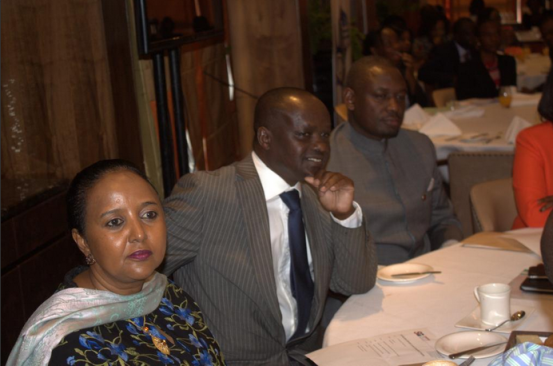
Nairobi, Kenya: The Nairobian Newspaper Thursday morning launched a new column dubbed The Nairobian Defender. The launch was attended by among others, Cabinet Secretary for Foreign Affairs Amina Mohamed and Chairperson of the Commission on Administrative Justice Dr. Otiende Amollo. Below is Amollo’s key note speech.
It gives me great pleasure to join you today as the Distinguished Guest on this occasion of the launch of the Nairobian Defender. I take this opportunity to commend the Standard Group for the invitation and this initiative that seeks to improve service delivery ‘tackle a diverse range of issues related to specific instances of maladministration.’ This is indeed a milestone towards good public governance in Kenya that could not have come at a better time than now when we are focusing on improving public administration and service delivery.
I wish to point out that service delivery is at the heart of our new constitutional dispensation. As most of you may recall, at some point in the history of this nation, receiving a public service was a favour rather than a right. In other words, public services were delivered at the whims of public servants. This era is long past. The Constitution of Kenya 2010 provides safeguards that remind those entrusted with leadership that power belongs to the not to them, but to the people. Such authority vests the responsibility to serve the people, rather than power to rule them.
Maladministration is one of the greatest obstacles to the realization of quality service envisaged by the Constitution. Maladministration includes aspects such unreasonable delay, administrative injustice, oppressive, unresponsive, unlawful, prejudicial and unfair conduct, impropriety, abuse of power, discourtesy, inefficiency, manifest injustice, incompetence, ineptitude, unfair treatment and misbehaviour in office. In Kenya, like elsewhere, the poor are the most affected by maladministration due to their low economic and social power.
THE COMMISSION ON ADMINISTRATIVE JUSTICE
The Commission on Administrative Justice (Office of the Ombudsman) is established under Article 59(4) of the Constitution and the Commission on Administrative Justice Act, 2011. The mandate of the Commission is to enforce administrative justice in the public sector by addressing maladministration through effective complaints handling and alternative dispute resolution. In addition, the Commission has a constitutional mandate to safeguard public interest by promoting constitutionalism, securing the observance of democratic values and principles, and protecting the sovereignty of the people.
The establishment of the Commission was borne out of the endemic institutional and systemic failures in the Kenyan public sector which affected service delivery. In particular, service delivery in public institutions was characterized by undue delays, abuse of power, discourtesy, inefficiency, corruption, ineptitude, manifest injustice and misbehaviour among others.
We are a key player in service delivery and good governance in Kenya through redress of maladministration. Our role flows from our mandate under Article 59(2)(h-k) of the Constitution as read with Section 8 of the Act, which empower the Commission to investigate any conduct in state affairs, or any act or omission in public administration in any sphere of government, as would be prejudicial, constitute improper conduct, or amount to abuse of power. Accordingly, we undertake administrative review in the event of maladministration such as delay, inefficiency, discourtesy, ineptitude or unresponsiveness, and provide redress. These may take different forms such as complaints handling, advisory opinions, monitoring of complaints handling by public institutions under performance contracting, complaints capacity building for public institutions, public interest litigation, public education and training as well as promotion of alternative dispute resolution methods in public administration.
ROLE OF MEDIA IN PUBLIC ADMINISTRATION
The role of the media in public administration cannot be gainsaid. It is at the heart of good governance and plays a crucial role in shaping public administration and democracy. Principally, the media has three key roles in contributing to good governance. First and foremost, it acts as a watchdog by promoting accountability, transparency and public scrutiny. Second, it provides the platform for debate on topical issues, facilitating informed decision making. Third, it sets the agenda for policy makers, strengthening government responsiveness to specific issues.
In their watchdog role, the media can play an important role in promoting transparency, accountability, and public scrutiny of decision-makers, by highlighting policy failures, maladministration and corruption. Investigative journalism can help in unearthing malpractices and systemic failures in public administration thereby making public officers accountable and improving service delivery. They can also create a platform for informed citizen engagement with the leaders through debates and educative programmes thereby promoting citizens’ vigilance which ultimately improves public administration and the rule of law. The foregoing is evidently true in the case of Kenya where the media has played and continues to play a crucial role in the democratisation and governance processes. Indeed, it is for this reason that Article 34 of the Constitution recognises the freedom of the media.
LAUNCH OF THE NAIROBIAN DEFENDER
I pleased to note that the Standard Group, through the Nairobian Publication, has taken an unprecedented approach of designating a column in the Publication to tackle diverse range of issues of maladministration affecting Kenyans. The launch of this Column titled ‘The Nairobian Defender,’ is a bold, proactive and inspiring testament of the role played by the Standard Group in enhancing good governance. The Column will provide the much needed platform for highlighting issues of maladministration and advocating for redress and reforms. The publicity will not only bring the searchlight on areas of service failures, but also empower the public through education and advocacy.
Stay informed. Subscribe to our newsletter
As the Office that is tasked to address maladministration in the public sector in Kenya, we take this opportunity to applaud and identify ourselves with this initiative which we believe will go a long way in complementing our work. The initiative presents opportunities in the following respects:
Identifying and highlighting the plight of members of the public who have affected by maladministration in service delivery;
Analyzing and highlighting the trend of systemic issues that lead to service failures in the public service;
Referring matters of maladministration to the Commission for appropriate action;
Monitoring and advocating for the implementation of various reports and documents from the Commission; and
Highlighting reports, cases, articles and opinion pieces from the Commission that relate to maladministration and poor governance.
As we launch this Column today, I wish to urge you to not only ensure robust and bold reporting of issues of maladministration, but also to consider the need for an ombudsman for the private sector. This will enhance service delivery and good governance beyond the public sector. Ultimately, it will reduce instances of unnecessary litigation and improve governance. As the national Office of the Ombudsman, we are willing to support the private sector in this endeavour.
Once again, I wish to commend the Standard Group for this initiative and assure you of our commitment to partner with you in this regard. As a stakeholder, your collaboration will be key to the realisation of good governance and effective oversight in Kenya
With these remarks, it is now my singular pleasure to officially launch the Column ‘The Nairobian Defender.’
 The Standard Group Plc is a
multi-media organization with investments in media platforms spanning newspaper
print operations, television, radio broadcasting, digital and online services. The
Standard Group is recognized as a leading multi-media house in Kenya with a key
influence in matters of national and international interest.
The Standard Group Plc is a
multi-media organization with investments in media platforms spanning newspaper
print operations, television, radio broadcasting, digital and online services. The
Standard Group is recognized as a leading multi-media house in Kenya with a key
influence in matters of national and international interest.
 The Standard Group Plc is a
multi-media organization with investments in media platforms spanning newspaper
print operations, television, radio broadcasting, digital and online services. The
Standard Group is recognized as a leading multi-media house in Kenya with a key
influence in matters of national and international interest.
The Standard Group Plc is a
multi-media organization with investments in media platforms spanning newspaper
print operations, television, radio broadcasting, digital and online services. The
Standard Group is recognized as a leading multi-media house in Kenya with a key
influence in matters of national and international interest.






